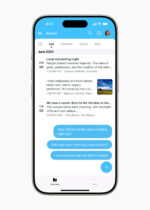Appraising those app stores
With the announcement of Intel’s AppUp, it would seem that truly everyone has their own app store now, even companies that don’t actually deal with consumers very often. But Intel is not the first company to get on the bandwagon, not by a long shot.
It all began with Apple, as it usually does when there is a UI paradigm shift in the marketplace. The iPhone app store fixed everything that sucked about smartphones. Remember when you got your first BlackBerry? Or Palm Pilot? Remember how difficult it was to find good applications for those devices? And when you got them, you had to download them to a PC then upload them to the device.
Fortunately, that’s all part of the past, unless you still use a BlackBerry, in which case finding their AppWorld store is half the battle. Today, we have the Android store, Google’s Web applications store, the Palm app store, the Java app store, and a dozen other also-rans on the Web. It’s getting a bit out of control, really.
I’m actually happy to see the rise of app stores. For years, finding good software has been a hunting-and-pecking affair, often driven by word of mouth. Rarely was it possible to find a comprehensive list of software that wasn’t out of date or horribly skewed toward the proclivities of one software maker.
In Windows, this is an even keener problem: Users are expected to find applications in the wild, and then to install these apps themselves. Sure, that’s no problem for you and me, but for the average inexperienced user, that’s a difficult process. Never mind the fact that this also raises the chances of someone downloading virus-ridden software, or loading an app that will never go away and constantly pesters the user to register.
Of course, us Linux users have known and used app stores for years. We just call them repositories. — Alex Handy
Jobs report
The U.S. high-tech industry added 32,000 jobs between January and June of 2010, a 0.5% gain, according to a report released by TechAmerica Foundation, a non-profit organization that researches the U.S. technology industry.
The report is based on the U.S. Bureau of Labor Statistics data and looks at four sectors in the high-tech industry: tech manufacturing, communications services, software services, and engineering and tech services.
“As one of the last industries to feel the effects of the recession, the technology industry now appears to be slowly turning the corner with the rest of the economy,” said TechAmerica president and CEO Phil Bond.
From June 2009 through June 2010, the technology sector lost 72,800 jobs, a 1.2% workforce decline. Included in the jobs lost were 22,800 in communications services. Although, software services added 14,200 jobs and engineering and tech services added 29,700 jobs the first six months of this year. — Katie Serignese
Don’t tell him about keeper leagues
I used to love Sundays in the fall. To me, that meant football. And that meant getting together with a few friends to watch the Giants game.
Well, I don’t love Sundays in the fall so much anymore. And I blame it on the Internet. The ability to get updated individual player statistics in real time has led to a boom in “fantasy football,” which has, to many, become more important to them than the outcome of real games. Now, Sundays mean getting together with a “fantasy league” of friends to watch all the weekend’s games at once via the NFL package, while their laptops are open to the fantasy league hosting site where their players’ stats are constantly updating.
That whole “fantasy” thing is weird to me. We were watching the Giants game last week—when it wasn’t being switched to another game because some relatively obscure running back in the Seattle-San Francisco game might have a chance to score on a second-and-2 play—and one of guys said: “Let’s put on the Cowboys game. I hate them, but I activated Marion Barber this week, and I want to see if he scores.”
So, rooting has become more complicated due to the Internet: You can hate a team, but still root for an individual player on that team to have a good game—maybe even against a team you like—because you need his stats to boost your fantasy team. Give me the days when everyone who watched football with me wore the same jersey and rooted for the same team. And watched one game and one game only. — David Rubinstein
Google does it again
Google Instant came out recently, and the tech press seemed to love it. I’m not sure why, as all it is is a more advanced autocomplete, except this time it slows things down as the page updates as you type.
I can understand Google trying to hype its own inconsequential product updates (11,000 work hours saved!!! At last, I no longer have to hit enter/return when I search), but why did the press buy so heavily into it? Hmmm, maybe, in a roundabout way, I just answered my own question. — Adam LoBelia





